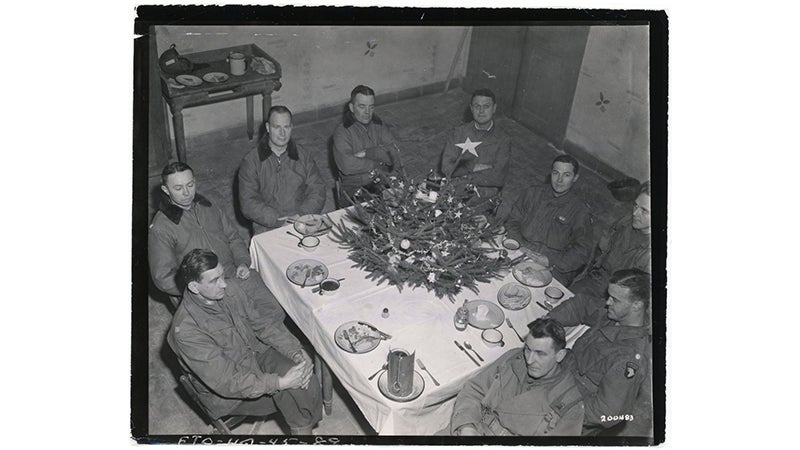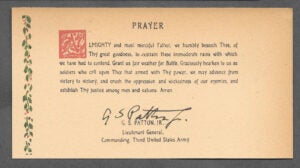COLUMN: Christmas with the troops – 1944
Published 1:00 pm Friday, December 15, 2023

- Christmas Day 1944: Officers of the 101st Airborne Division have Christmas dinner in Bastogne, Belgium while the city was still under siege. Brig.Gen Anthony C. McAuliffe [4th from the left] was the commander of the besieged troops and was famous for his reply, "Nuts!", when asked by the German commander to surrender. [Photo: army.mil]
|
Getting your Trinity Audio player ready...
|
It was a little more than 79 years ago that many of our Alabama soldiers, along with their brothers in arms, were engaged in a life or death struggle to repel a German attack along a 74-mile stretch of lightly defended battle lines in the Ardennes Forest in Belgium. The Battle of the Bulge, as it would later be known, was fought in the middle of one of the coldest winters ever recorded in Europe. The attack on the morning of Dec. 16 was led by some 200,000 German troops and more than 1,000 tanks. Hitler and the German war machine were desperately trying to split the allied armies in half and take over the port of Antwerp, Belgium. Their goal was to block allied supplies and re-enforcements for the European theater from Antwerp.

General George S. Patton’s Christmas prayer 1944. A copy was given to each member of his 3rd Army. [Photo: Pinterest]
The battle reached its peak with the siege of Bastogne, which lasted from Dec 20 through Dec 27. Bastogne was strategically important to both sides. Once the Germans had the city encircled, the German commander sent a hand-delivered note asking the American commander to surrender. The American commander was Brig. General Anthony C McAuliffe, who would later become famous for his one-word reply, “Nuts!”
For both the US troops within the city of Bastogne and those defending it from the outside, Christmas 1944 was celebrated “in any way they could manage”. An Army Chaplain held Christmas services inside Bastogne. For those on the battlefield outside, it was survival first, Christmas celebration second. Many stories have been told by those soldiers about their experiences that Christmas. One such story was recorded by BBC interviewer, Keith Davis in 2016:
“We were out in the outskirts of Bastogne, we found this farmhouse. Inside was a man and a woman and a little boy and a little girl….the wife gave us some soup and some black bread. We stayed there all night in this farmhouse. The war was going on fiercely outside and for some reason, the farmhouse never got hit. We were there Christmas Eve. We sang Christmas songs that night with this Belgian family. We sang Jingle Bells and Silent Night. The words were different but the music was the same.”
General George S. Patton had been in France attacking eastward near the Saar River when he received orders from Supreme Allied Commander General Dwight D. Eisenhower. He quickly wheeled his 3rd Army 90 degrees and covered the 100 miles to Bastogne in three days. The 3rd Army was quickly able to liberate Bastogne. The siege had been aided by bad weather and heavy cloud cover. Once the weather cleared, allied bombers were able help lift the siege.
Every soldier in the 3rd Army had been given a copy of a Christmas Prayer of 1944, written by General Patton.
“Almighty and most merciful Father, we humbly beseech Thee, of Thy great goodness, to restrain these immoderate rains with which we have had to contend. Grant us fair weather for Battle. Graciously hearken to us as soldiers who call upon Thee that, armed with Thy power, we may advance from victory to victory, and crush the oppression and wickedness of our enemies, and establish Thy justice among men and nations. Amen.”
Gen. Patton was already known for his mastery of mobile warfare, but the liberation of Bastogne became his crowning achievement. On Dec. 26, just one week after Gen. Patton began his march, his 4th Armored, 37th Tank Battalion, under the command of Lt. Col Creighton Abrams, broke through the encircled German lines at Bastogne.
For the Americans holed up in Bastogne, Christmas of 1944 became an unforgettable Christmas. To be liberated on the day after Christmas was a unique gift. Gen. Patton and his 3rd Army became Santa Claus to those troops who had been under siege.
The war would drag on for almost another five months after the Battle of the Bulge. Germany’s unconditional surrender came on May 8, 1945.
Let us celebrate Christmas this year and give thanks for the greatest gift of all, the birth of Jesus Christ. And may we remember those soldiers at Bastogne and give thanks for those soldiers and sailors who won’t be home this Christmas. They are over there somewhere serving so that we may celebrate Christmas over here. Merry Christmas!
John Vick
Author’s note: The author’s namesake, Sgt. John Aubrey Feagin, 550th Airborne Infantry Battalion, 17th Airborne Infantry Regiment, was killed on January 4, 1945. He was a cousin and best friend of the author’s father, Frank Vick. John Aubrey Feagin was a native of Enterprise, Alabama, and the only son of Hubert and Edith Feagin. This story is dedicated to his memory.
[Sources: Quora, History.net, U.S. Business Insider, army.mil, Wikipedia, Fold3]





